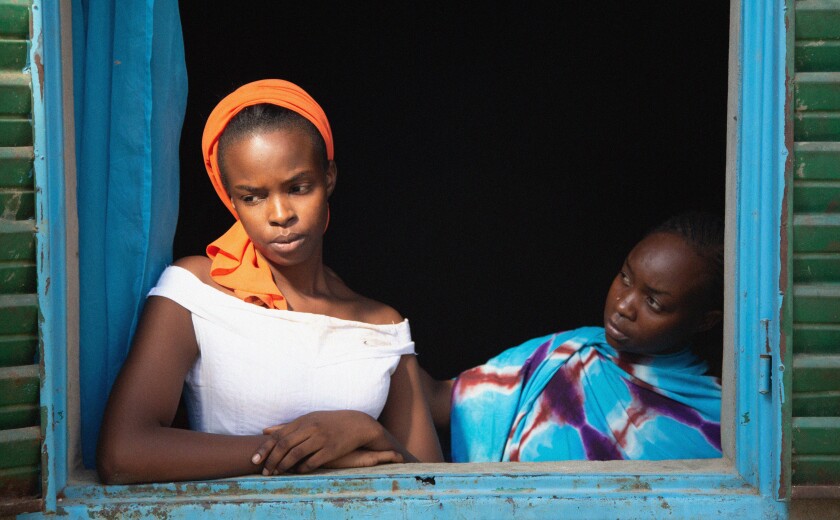“Daddy, are you observing a motion picture?”
The concern arrives about midway via Kogonada’s charming science-fiction drama “After Yang,” a melancholy balm for the moviegoing soul. It’s posed by a younger female (Malea Emma Tjandrawidjaja) to her father (a by no means-better Colin Farrell), who is in fact looking at a film — truly a bunch of motion pictures, little 5-2nd movie clips excavated from the memory financial institution of a malfunctioning technosapien, or robotic. (That’s the Yang of the title, played by Justin W. Min the rest of the story I’ll go away to your discovery.) It created me smile mainly because it is a problem my 4-yr-old daughter normally asks me when I’m observing a motion picture at household, commonly with a abide by-up: “Are you looking at it for do the job?”
As it comes about, I did check out “After Yang” for function. Not at dwelling but at an L.A. press screening scheduled to coincide with the movie’s new premiere at the Cannes Movie Competition, which surged in advance this 7 days soon after canceling its 2020 edition due to the COVID-19 pandemic. It was a bummer — but a necessary 1 — to skip this year’s function and overlook out on a 10-working day glut of new global cinema, additionally the chance to see expensive pals and colleagues in individual, some of them for the initial time in two yrs.
Although several of those colleagues chose to sit out this year’s function as well, just as many some others opted to take the plunge and embrace an even a lot more chaotic Cannes than normal, braving the masked and unmasked throngs, not to mention the sweltering French Riviera heat. (Postponed until eventually July this year, the festival is usually held in the additional temperate climes of Could.) I have the two assuaged and exacerbated my pageant FOMO by looking at the tweets and trade dispatches out of the pageant even a lot more avidly than normal, alternating between nervous chatter about COVID basic safety protocols and appreciative, even enthusiastic reactions to the motion pictures by themselves.
Rihane Khalil Alio, remaining, and Achouackh Abakar Souleymane in the film “Lingui.”
(Mathieu Giombini / Pili Films)
“After Yang,” which is premiering in Un Particular Regard, a application devoted to new and rising filmmakers, surely warrants enthusiasm. It is the 2nd aspect-duration operate from the South Korean-born filmmaker and online video essayist Kogonada and an unsurprising confirmation of his talent pursuing his swish 2017 debut, “Columbus.” Like that motion picture, however with artificial intelligence standing in for modernist architecture, this wry and wistful futuristic tale has a sharp eye for expressive visual areas and manages to be both equally simply cerebral and deeply psychological. It’s dependent on Alexander Weinstein’s limited story “Saying Goodbye to Yang” the tweaked title couldn’t support but remind me of Hirokazu Kore-eda’s “After Life” (1999), a further achingly fragile film about grief, decline and memory.
“After Yang,” which is remaining distributed by A24, is just one of a handful of Cannes entries that, by the kindness of publicists and distributors, I was capable to see listed here in L.A. ahead of and for the duration of the festival. Even if I’d smuggled in a flask of rosé and a hunk of cheese, it would not have been rather the exact same working experience as seeing a film in the very best and biggest theaters at Cannes’ Palais des Festivals, wherever a movie can receive nearly anything from a rapturous five-moment standing ovation from the black-tie crowd to a storm of derisive boos from the press. One of the most noticeable dissimilarities is that when you check out a film by yourself, you generally come to feel even freer to get the film at its possess pace and volume — an technique that can function properly for a film like “After Yang,” whose hushed, unhurried passages have the result of carefully recalibrating your rhythms.
An audience of 1 can also get the job done for a leaner, pacier tale like “Lingui,” even if this most current drama from the Chadian director and Cannes veteran Mahamat-Saleh Haroun (“A Screaming Man”) also attributes moments that simply call for righteous applause. Participating in in competitors for the Palme d’Or, the festival’s best prize, the movie unfolds on the dusty outskirts of Chad’s capital, N’Djamena, in which a woman (Achouackh Abakar Souleymane) is driven to initially determined, significantly defiant motion when she learns that her 15-12 months-aged daughter (Rihane Khalil Alio) is expecting. A blistering attack on patriarchy and a warm reaffirmation of “the sacred bonds” (the that means of the film’s title) amid girls, it is a bracing perform that passes promptly in 87 minutes. But the environment it demonstrates us, etched in totally felt performances and superbly hued compositions, feels vividly, at times overwhelmingly current.

Josh O’Connor and Odessa Young in the motion picture “Mothering Sunday.”
(Sony Images Classics)
“Lingui” felt specifically taut as opposed with some of the saggy, 140-minute-in addition operating instances that have swollen the Cannes formal choice. I’m talking generally about the festival’s divisive opening-evening film, Leos Carax’s beguilingly deranged musical “Annette,” which stars Marion Cotillard and a mesmerizing Adam Driver and options tracks by the artwork-pop duo Sparks. Just as prolonged if additional stylistically straightforward is “Stillwater,” Tom McCarthy’s involving drama starring Matt Damon as an Oklahoma oil worker trying to free of charge his daughter, who’s serving time for murder in a French jail. Like a lot of what will get unveiled in Cannes, the two these incredibly hot-ticket picks had their admirers and detractors. Both of those also proved emblematic of the cultural cross-pollination that a key global festival such as Cannes likes to embrace.
“Stillwater,” named right after a city in Oklahoma, usually takes position nearly totally in the French port metropolis of Marseille. “Annette,” nevertheless established in Los Angeles and total of regional landmarks (Disney Corridor! The Orpheum! Naan Hut!), was shot typically in Belgium and Germany and carries the inimitable sensibility of just one of France’s most daring auteurs. Nevertheless to occur following 7 days in the Cannes competitors, together quite possibly equivalent strains: Wes Anderson’s “The French Dispatch,” which is set in and all over a Kansas newspaper’s French foreign bureau, and which characteristics French actors like Léa Seydoux and Mathieu Amalric, and French-sounding actors like Timothée Chalamet, alongside seasoned members of the Anderson repertory like Tilda Swinton, Invoice Murray and Owen Wilson.
The abundance of French and French-adjacent merchandise is under no circumstances a shock in a festival that exists, among other explanations, to encourage the French film marketplace and a happy eyesight of French cultural tradition to the earth. It also invariably capabilities a selection of French filmmakers functioning in distinct cultures and languages. This calendar year, that group consists of not only Carax but also Eva Husson, previously in competition with her 2018 war film, “Girls of the Sunshine,” who returned to the festival with the English-language time period drama “Mothering Sunday.”
Unveiled in a new out-of-competitors area identified as Cannes Premiere, this absorbing if inelegantly fractured adaptation of Graham Swift’s novel centers on Odessa Younger (“Shirley”) and Josh O’Connor (“The Crown”) in properly performed, uninhibitedly fleshy turns as an early 20th century English housemaid and the wealthy scion she’s obtaining an affair with. A forthcoming Sony Shots Classics launch, “Mothering Sunday” suggests a stray tendril of “Downton Abbey” expanded to attribute length, splintered into three time frames and then funneled, with a lot loud banging of typewriter keys, into the origin story of a great literary mind. It never quite will come jointly — the decades-spanning connective tissue by some means feels both overstated and slender — but Husson’s skill with actors, amongst them Colin Firth, Olivia Colman, Ṣọpẹ Dìrísù and the great Glenda Jackson, yields simple dividends.

Honor Swinton Byrne in the movie “The Memento Part II.”
(Josh Barratt / A24 Movies)
As it occurs, the ideal Cannes 2021 movie I’ve witnessed so much is also the tale of an English artist coming into her very own: a youthful London film university student named Julia (the outstanding Honor Swinton Byrne), having difficulties to reconcile everyday living and art soon after a devastating personalized decline. If the particulars audio familiar, which is because “The Memento Component II” is a sequel — a masterful, perhaps even top-quality sequel — to Joanna Hogg’s 2019 standout, “The Souvenir.” Jointly, the two form an exquisite, semiautobiographical two-parter that tells a tale we not often see, at minimum not with this stage of intelligence, detail and experience: It is a wonderful filmmaker’s youthful self-portrait, affectionate and significant by turns, and a welcome reminder that at their purest, passion and criticism spring from the very same generous impulse.
A forthcoming A24 release that premiered in Directors’ Fortnight, a system that operates parallel to the Cannes formal choice, “The Memento Part II” is somehow both of those sadder and funnier than its predecessor, shorter in size (I desire it were being longer) but even a lot more cumulatively heartrending. As at any time, Hogg is functioning so near to the bone in this article, so immersed in the trivialities of her ’80s education and learning and but so attentive to how she situates the viewer in that earth, that even throwaway moments feel to obtain disproportionate impression: There is a second that transpires in between Julia and her mom (once more played by Tilda Swinton, the lead actress’ true-everyday living mother) that is so hushed, still so acutely devastating, that it made me gasp aloud in my almost empty theater.
A lot more than with any of my Cannes-away-from-Cannes screenings, I left “The Souvenir Aspect II” unusually perplexed at not having anyone to chat about it with, only to be seized by a common, reassuring impulse, the a single that will take around on all those instances when a critic gets to be an evangelist. I’ve witnessed an incredible motion picture. And I hope that someday really quickly, you are going to get to see it also.

